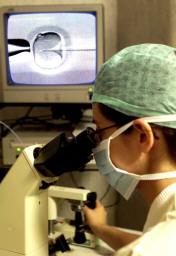Sexist attitudes among Italian men are preventing female scientists making the progress they deserve, a top oncologist and former health minister said on Monday.
Speaking at a research grants awards ceremony, Umberto Veronesi said women possessed all the right qualities to make them outstanding scientists.
''There are many women keen to work in science, who are well trained and enthusiastic,'' he said.
''Women's great talent lies in the fact they are ideally suited to work in science. They are imaginative, creative and have the courage to think outside accepted patterns''.
According to Veronesi, now a senator with the centre-left Democratic Party, traditional attitudes in society are to blame for the lack of Italian women in research.
''Unfortunately women are discriminated against because men have always held all the power,'' he said.
''Truth be told, if a man and woman are equally talented, the man will nearly always get further ahead. This could be because there is still the idea that men are meant to be the main breadwinners''.
Veronesi also bemoaned the fact that even women who get started on the career ladder, rarely make it beyond the first rungs.
''The problem is there are so few jobs available in research, and women are also held back,'' he said.
''It's rare to see a women make it beyond the first stages and into top positions that allow them to fully express their intellectual capacities''.
The former minister cited the fact that over 300 Italian women had applied for the five research grants awarded on Monday.
The grants, funded by cosmetics company L'Oreal, are part of a Women in Science project organized jointly with the UN's cultural and educational body UNESCO.
The international initiative, now in its tenth year, awards specialist grants to five women from 35 countries around the world.
The five Italian winners this year were a cytogentecist using Antarctic fish to study the impact of environmental changes on the genome; a physicist working on gamma-ray bursts, luminous electromagnetic events in space; a biophysicist working in cancer research; a surgeon studying heart disease; and an endocrinologist researching heart disease, metabolism and hormonal disorders caused by Cushing's Syndrome.









